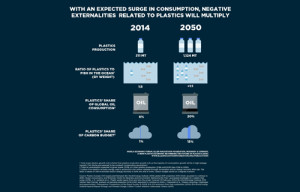A new Ellen MacArthur Foundation report, finished in partnership with the World Economic Forum, warned that if no imminent actions are being taken, by 2050 there would be more plastics than fish (by weight) in the ocean.
The use of plastics has increased 20-fold in the past half-century, from 15 million tons in 1964 to 311 million tons in 2014, and is expected to double again in the next 20 years, according to the report.

Plastic packaging, the focus of this report, represents 26% of the total volume of plastics used. While plastic packaging delivers direct economic benefits and contributes to increased level of resource productivity, the report found that 95% of plastic packaging material values, or US$80-120 billion annually, is lost to the economy after a short first use.
Plastic packaging is almost exclusively single-use, especially in business-to-consumer applications. Only 14% of plastic packaging is collected for recycling. When additional value losses in sorting and reprocessing are factored in, only 5% of material value is retained for a subsequent use, said the report.
At least 8 million tons of plastics leak into the ocean each year. Estimates suggest that plastic packaging represents the major share of this leakage. The best research currently available estimates that there are over 150 million tons of plastics in the ocean today.
In a business-as-usual scenario, the ocean is expected to contain 1 ton of plastic for every 3 tons of fish by 2025, and by 2050, more plastics than fish (by weight).
Underpinned by and aligns with principles of the circular economy, the report calls for a “New Plastics Economy”, where the plastics re-enter the economy as valuable technical or biological nutrients.
Its ambition is to deliver better system-wide economic and environmental outcomes by creating an effective after-use plastics economy, drastically reducing the leakage of plastics into natural systems (in particular the ocean) and other negative externalities.
The report suggested several areas to work on, for example, establishing a global plastics protocol and coordinate large-scale pilots and demonstration projects, mobilizing large-scale “moon shot” innovations and developing an economic and scientific evidence base.
Website: www.adsalecprj.com








